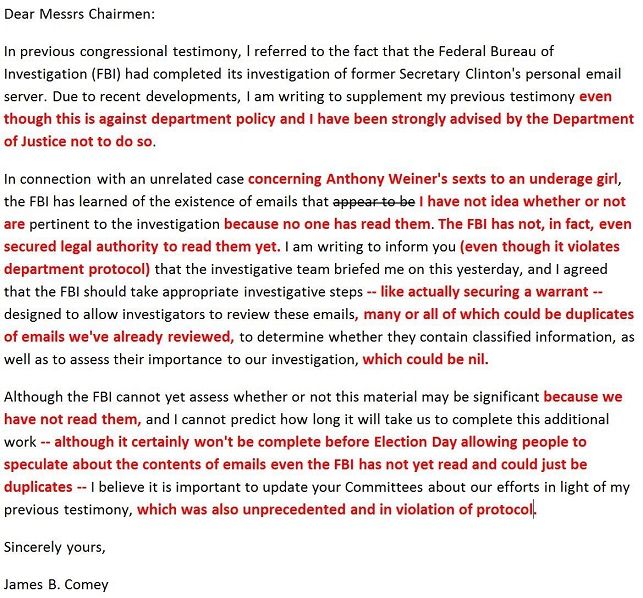On Friday, the director of the F.B.I., James B. Comey, sent to members of Congress a letter updating them on developments in the agency’s investigation of Mrs. Clinton’s emails, an investigation which supposedly was closed months ago. This letter, which was quickly posted on the internet, made highly unusual public statements about an F.B.I. investigation concerning a candidate in the election. The letter was sent in violation of a longstanding Justice Department policy of not discussing specifics about pending investigations with others, including members of Congress. According to some news reports on Saturday, the letter was sent before the F.B.I. had even obtained the search warrant that it needed to look at the newly discovered emails. And it was sent days before the election, at a time when many Americans are already voting.
Violations of the Hatch Act and of government ethics rules on misuse of official positions are not permissible in any circumstances, including in the case of an executive branch official acting under pressure from politically motivated members of Congress. Such violations are of even greater concern when the agency is the F.B.I.
It is not clear whether Mr. Comey personally wanted to influence the outcome of the election, although his letter — which cast suspicion on Mrs. Clinton without revealing specifics — was concerning. Also concerning is the fact that Mr. Comey has already made highly unusual public statements expressing his personal opinion about Mrs. Clinton’s actions, calling her handling of classified information “extremely careless,” when he announced this summer that the F.B.I. was concluding its investigation of her email without filing any charges.
But an official doesn’t need to have a specific intent — or desire — to influence an election to be in violation of the Hatch Act or government ethics rules. The rules are violated if it is obvious that the official’s actions could influence the election, there is no other good reason for taking those actions, and the official is acting under pressure from persons who obviously do want to influence the election.
Absent extraordinary circumstances that might justify it, a public communication about a pending F.B.I. investigation involving a candidate for public office that is made on the eve of an election is thus very likely to be a violation of the Hatch Act and a misuse of an official position. Serious questions also arise under lawyers’ professional conduct rules that require prosecutors to avoid excessive publicity and unnecessary statements that could cause public condemnation even of people who have been accused of a crime, not to mention people like Mrs. Clinton, who have never been charged with a crime.
This is no trivial matter. We cannot allow F.B.I. or Justice Department officials to unnecessarily publicize pending investigations concerning candidates of either party while an election is underway. That is an abuse of power. Allowing such a precedent to stand will invite more, and even worse, abuses of power in the future

